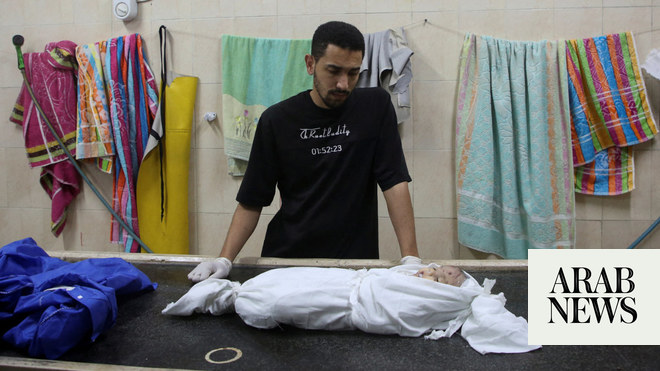
At least 16 people have been killed in Israeli airstrikes across central Gaza on Sunday night and Monday morning, including five women and four children, Palestinian health officials have said.
Rescuers said an airstrike early on Monday destroyed a residential building in the densely populated Nuseirat refugee camp in the heart of central Gaza, killing at least 10 people, including four women and two children.
The al-Awda hospital, which received the bodies, confirmed the deaths and said another 13 people were wounded. Hospital records quoted by local media show that the dead included a mother, her child and her five siblings.
In a separate strike targeting a building in Gaza City, six people died. A woman and two children were among the dead, according to the civil defence, a team of emergency responders working under the governance of Hamas.
Israel says its military operations exclusively target combatants and claims Hamas and other armed factions place civilians at risk by operating within residential areas.
Eleven months into the Gaza war, the death toll among Palestinians has passed 41,000, according to health authorities in the territory. Most of the dead are civilians and the total is nearly 2% of Gaza’s prewar population, or equal to one in every 50 people. The conflict was triggered by Hamas’s 7 October attack on Israel, in which 1,200 people died and about 250 were taken hostage.
On Sunday evening, a senior Hamas official told Agence France-Presse that new generations of fighters had been recruited since the 7 October attacks, less than a week after the Israeli defence minister, Yoav Gallant, told journalists that Hamas “no longer exists” as a military formation in Gaza.
During an interview in Istanbul, Osama Hamdan claimed that the militant group “has a high ability to continue”.
He added: “There were martyrs and there were sacrifices … but in return there was an accumulation of experiences and the recruitment of new generations into the resistance.”
The Hamas chief, Yahya Sinwar, congratulated the Yemeni Houthi group for reaching central Israel with a surface-to-surface missile for the first time on Sunday, causing a fire near Kfar Daniel.
“I congratulate you on your success in reaching the depth of the enemy entity,” Sinwar said in a letter to the Houthi leader, Abdulmalik al-Houthi. “I assure you that the resistance is fine. We have prepared ourselves to fight a long battle of attrition,” he said.
This is reportedly Sinwar’s third public message in the last week, after he congratulated the Algerian president, Abdelmadjid Tebboune, on winning the “renewed trust” of his people in the election on 9 September, and showed gratitude for Hezbollah’s continuing fight against Israel on Friday.
Before then Sinwar, who is believed to be hiding underground in Gaza, had made only one other official statement since the war began, in late October, when he offered the immediate release of Israeli hostages in exchange for the release of all Palestinian prisoners. Israel is conducting an extensive manhunt in Gaza for the man responsible for the 7 October massacre.
The Israeli military is investigating whether the fire near Kfar Daniel was the result of falling fragments caused by interceptor missiles launched at the projectile, or if the missile successfully penetrated its air defences, as the Houthis have claimed.
The Israeli prime minister, Benjamin Netanyahu, said the Houthis would pay a “heavy price”, while the Houthi leader warned of bigger attacks to come.
On Monday, the Houthi military spokesperson, Yahya Saree, said the group downed a US MQ-9 drone in Yemen’s Dhamar province.
In a separate development on Monday, Gallant told the US defence secretary, Lloyd Austin, that time was running out for an agreement with Hezbollah to halt the fighting along the Israel-Lebanon border, where on Sunday the Israeli military reported that approximately 40 projectiles had been launched, with the majority being intercepted or landing in uninhabited regions.
“The possibility for an agreed framework in the northern arena is running out as Hezbollah continues to ‘tie itself’ to Hamas,” Gallant said, “The trajectory is clear.’’
Hezbollah said it would halt its attacks if there was a ceasefire in Gaza, but months of talks brokered by the US, Qatar and Egypt have repeatedly stalled.
Gallant told Austin that “in any possible scenario, Israel’s defence establishment will continue to operate with the aim of dismantling Hamas and ensuring the return of hostages held by Hamas in Gaza – by any means”.
Meanwhile, media reports in Israel suggested Gallant’s position could be under threat, with sources in the prime minister’s office saying Netanyahu was considering appointing the New Hope chair, Gideon Sa’ar, as Gallant’s replacement.
After the report, the far-right national security minister, Itamar Ben-Gvir, said on X: “The time has come to [fire Gallant] immediately.”
Rumours that Netanyahu would replace Gallant have been circulating for months. The already strained relationship between the two has been tumultuous since Netanyahu’s sudden decision to dismiss Gallant in March 2023 because of his vocal disapproval of the government’s judicial changes. However, the prime minister’s move was later rescinded after public outcry.
Some in Netanyahu’s administration have called for Gallant’s removal, citing a range of grievances including his stance against a government-supported ultra-Orthodox enlistment bill and his public disagreement with the prime minister on matters such as a hostage negotiation and Israel’s presence in the Philadelphi corridor on the Gaza-Egypt border.









